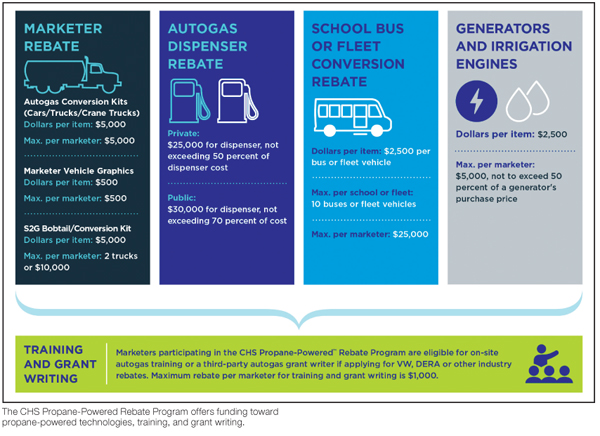As one of the largest propane wholesalers in North America, CHS (Inver Grove Heights, Minn.) is providing a new resource for propane marketers to adopt propane as an alternative fuel with its CHS Propane-Powered Rebate Program. The program is a first-of-its-kind initiative offering marketers rebates for adopting propane-powered technologies, participating in training, and making investments in autogas infrastructure. 
“We heard our customers say it’s hard to justify the cost of a dispenser or pay for other infrastructure if they don’t have any autogas customers,” said Andy Ernst, propane marketing manager at CHS, the country’s largest farmer-owned cooperative. “To help solve the problem and work to keep more American-made gallons here in the United States, CHS decided to invest in getting more marketers involved in autogas.”
Ernst and other CHS leaders saw several areas where they could help spur growth in addition to autogas dispensers. “Marketer conversion kits, school bus or fleet conversions, generators, irrigation engines, and training or grant writing support are all areas where CHS is willing to help with funding of $0.01 for every gallon of wholesale propane purchased,” Ernst said. CHS partnered with retail marketers to form the program, which offers rebates for sales dating back to January 1, 2018. “A lot of our customers have more than a year’s worth of purchases to their credit already.”
Propane-powered technologies
By taking advantage of the rebates, marketers can save thousands on propane-powered investments. The program offers a number of different options. Marketers can receive up to $5000 to convert their car, truck, or crane truck to autogas; two bobtail conversion kits or two new S2G bobtails can be funded at a maximum of $10,000; and as much as $500 can be used toward vehicle graphics. For private use, dispenser rebates allow up to $25,000 for a dispenser, not exceeding 50% of the dispenser cost. As much as $30,000 is allowed for dispensers available to the public, not exceeding 70% of cost. A limit of $25,000 at $2500 per vehicle can go toward school bus or fleet conversions with a max of 10 buses or fleet vehicles. A maximum of $5000, not to exceed 50% of a generator’s purchase price, may be allotted to propane generators and propane irrigation systems.
Training, Grant Writing
In addition to funding infrastructure, the industry is well-positioned to take advantage of grant dollars available due to the Diesel Emissions Reduction Act (DERA) and VW settlement. “These grant funds are available to encourage the use of alternative fuel, including propane, and the CHS Propane-Powered Rebate Program can help marketers capture grant dollars for propane instead of the electric industry,” said Ernst. To this end, marketers can receive a maximum rebate of $1000 toward training or grant writing. “Training and grant writing help marketers not only get funding, but also help with communicating the value of propane as an alternative fuel,” Ernst explained. Jeff Fisher of Fisher Consulting, who has won more than $220 million in DERA funding for various energy-related programs, is available through a partnership with CHS to provide grant-writing services. “I’m glad to partner with CHS to make sure any one of its co-op members or customers can start benefitting from autogas sales,” said Fisher, whose services range from drafting a grant proposal to simply helping edit an existing draft.
CHS also helps marketers take advantage of already existing autogas resources and training. “We partner with companies like ROUSH, Blue Bird, ICOM, and Alliance AutoGas, who already offer training; we just help make it available to our customers,” Ernst said. Along with webinar trainings, CHS offers free marketing materials that customers can utilize when talking with fleets and bus companies.
For Ernst, any step toward autogas adoption is a positive step. “Step one is to get people talking about autogas, and there has been great success in this area with school bus fleets. Through our partnerships, we can work with our wholesale customers to encourage school districts to learn about the cost savings and environmental benefits from switching to propane-powered buses.”
Ernst envisions propane marketers growing their gallons by leveraging the rebate money from CHS with other sources of funding. “Several propane state associations have funding for autogas that can augment funding from CHS to make some investments that require almost no out-of-pocket funding,” said Ernst. “We want to help CHS customers, but feel we are ultimately helping grow the whole industry.”
For more information on the CHS Propane-Powered Rebate Program, marketers can visit CHSPropaneInsights.com
Thursday, April 11, 2019

